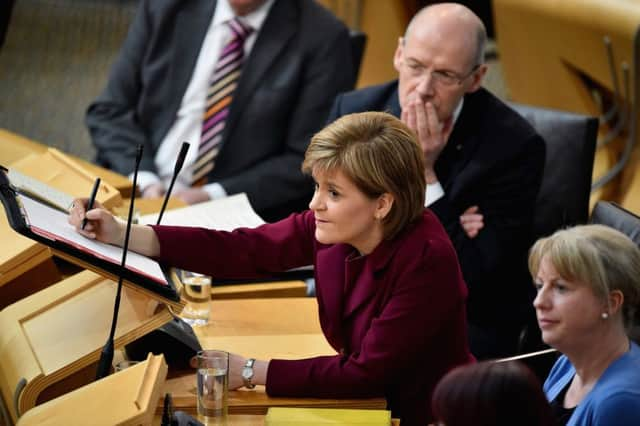Scott Macnab: the SNP are now facing real opposition again


The inevitable tinge of disappointment which the SNP leader may have felt had to be set against an overwhelming triumph at the ballot box where the party’s national vote share barely dropped from the remarkable victory secured by Alex Salmond in 2011.
With the independence-supporting Greens returning six MSPs, it ensured there was still a Nationalist majority in Parliament. The SNP would surely be able to navigate any controversial new laws and regulations through the legislative process without too much embarrassment.
Advertisement
Hide AdAdvertisement
Hide AdWell perhaps not. Recent weeks have seen a number of Holyrood reverses for the SNP which indicates that after five years of impotence, Parliament may again be ready to re-assert its authority over the executive of the day.
The newly invigorated opposition certainly seemed determined to take a stand in a number of key areas following the election.
Controversial laws to crack down on sectarian singing at football matches had always been at the centre of opposition concerns that they had been rushed through in response to one particularly tetchy Old Firm clash a few years ago. They have since been derided by sheriffs and supporters and action to repeal the worst of these laws was being touted as an early bloody nose for the Government.
A similar opposition consensus against cutting air passenger duty (APD) fractured after the Tories came out in support of the move.
As Brexit consumed political discourse in the aftermath of the EU referendum in June, it began to seem like Holyrood would provide few headaches for Ms Sturgeon. The first signs of real friction came when Ms Sturgeon was forced into a climbdown over the role of Parliamentary liaison officers (PLOs) – backbench MSPs appointed to ministers to act as “go betweens” with Parliament.
MSPs were infuriated when it was proposed that two of these PLOs – George Adam and Angus MacDonald – would also be sitting on committees where they were expected to scrutinise their ministers.
Anxious to avoid claims of conflict of interest Ms Sturgeon quickly climbed down and changed the rules. When Kezia Dugdale found herself at the centre of a voting blunder recently, all the embarrassing headlines focussing on the Labour leader belied a harder edge in the opposition stance against the Government.
Ms Dugdale’s failure to vote saved the Government from a surprise defeat on their plans to reform the council tax. This would have committed ministers to talks with the opposition about more sweeping reforms of the system.
Advertisement
Hide AdAdvertisement
Hide AdA week later ministers did lose their first Parliamentary vote since the election when the opposition used their clout to secure a Parliamentary majority against cuts and closures to local NHS services.
Health Secretary Shona Robison is now under pressure to review the plans. There was another reverse yesterday as a majority of MSPs came out against proposals curtailing their scrutiny of next year’s budget, Holyrood’s first since it acquired new tax raising powers. Although not binding, if Scottish ministers simply ignore this, they risk being seen as defying the “will of Parliament” in opponents’ eyes.
The opposition to the Budget plans has been led by Greens leader Patrick Harvie who seems determined to show that whatever constitutional alliances there may be, the SNP’s feet will be held to the fire when it comes to running Scotland.
The mood among the opposition seemed to harden in the aftermath of the Brexit vote. Ms Sturgeon was the one UK leader who initially seemed on top of the situation, making it clear in the immediate aftermath that she was determined to secure Scotland’s relations with the EU and would consider all options for this – even a new vote on independence.
She even secured the unanimous support of MSPs at Holyrood to negotiate Scotland’s place in the EU on the basis that it was not about independence. But when Willie Rennie went public in a Scotsman article accusing her of “betraying” the Holyrood consensus by using the vote to revive her push for leaving the UK, something seemed to change. Labour and the Tories quickly joined the chorus of dissent and suddenly Parliament is not such a happy hunting ground for Nicola Sturgeon. The last SNP Government was branded a “steamroller” by opponents and there does now seem to be a growing mood that can’t be allowed to happen again. Perhaps this will be no bad thing. Alex Salmond suggested that minority government was the best thing that happened to the SNP after the party clinched its historic first Scottish election victory in 2007 and was unable to form a coalition with the Lib Dems.
It meant his team of ministers and party managers were forced to develop their political antennae and work with other parties to get legislation through on an issue-by-issue basis. There were certainly hairy moments, notably when a Budget was rejected and only a threat to dissolve Parliament from Salmond saw it pass. Generally, though, politicians talked to each other and deals got done. Ms Sturgeon may have to re-discover a similar collegiate approach.
Her flagship plans are for transformational changes which will span generations. The proposal to get a generation of mothers back into the workplace with the introduction of a Scandinavian-style system of universal free childcare is at the heart of this. Similarly the ambition to drive down the schooling gap between rich and poor areas of Scotland will change lives.
Both enjoy a Holyrood consensus although cracks are emerging about the best way to achieve them. The Tories in particular now question whether universal childcare should be the priority when more flexibility in the current system is what’s desperately needed. One Holyrood vote Ms Sturgeon needn’t worry about will be on the Bill to stage an independence referendum in the next year or two. With the Greens on board a natural majority is already there. That decision is entirely in Ms Sturgeon’s hands.